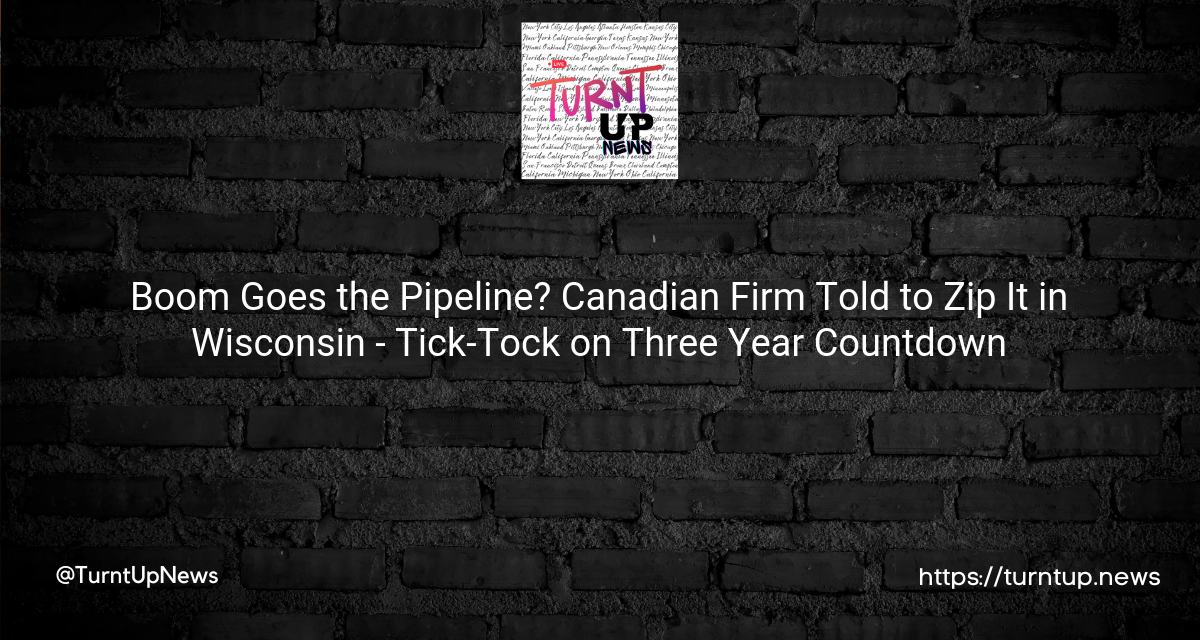💥Boom Goes the Pipeline? Canadian Firm Told to Zip It in Wisconsin – Tick-Tock on Three Year Countdown⏳
TL;DR: Courtroom gavel hammers down in Wisconsin! Canadian energy giant, Enbridge Inc., gets a three-year ultimatum to shut down a section of their oil and gas pipeline in a reservation belonging to the Bad River Band of Lake Superior Chippewa. Guess what? They’ve also been ordered to pay $5.1 million for trespassing. What’s the beef? The company’s land easements expired in 2013 and the tribe ain’t renewing them. 📝💔 With an aging pipeline close to a river and increased erosion, does this story carry an echo of caution for other companies with similar operations? Let’s see what’s up. 🧐
In a turn of events that sounds like a Netflix courtroom drama, Enbridge Inc., the Canadian energy powerhouse, has found itself on the losing end of a nearly four-year legal bout with the Bad River Band of Lake Superior Chippewa. This legal saga began when the tribe hauled Enbridge to court to pull the plug on its Line 5 pipeline and show it the exit door from the reservation. Let’s just say Enbridge’s guest pass expired way back in 2013 and the tribe ain’t in a mood for a renewal. 🏛️💼
Meet Line 5, our contentious oil and gas pipeline, about as old as your grandma, clocking nearly seven decades. 🕰️👵 It pumps up to 23 million gallons of light crude oil and natural gas liquids each day over a 645-mile stretch. The terrain? From Superior across northern Wisconsin and Michigan to Sarnia, Ontario. Long journey, right? 🛢️🗺️
The tribe’s lawsuit against Enbridge wasn’t just about expired permits. Nope! They had serious concerns that Mother Nature’s erosion could lay bare the pipeline, potentially leading to a rupture. And, when spring floods hit, heightening erosion along the Bad River’s banks where Line 5 calls home, their worries started to sound less like paranoia and more like a prophecy. At one point, the pipeline was a mere 11 feet from the river, at an area aptly named the meander. Quite the precarious predicament, eh? 😟🌊
In his Friday judgement, Judge William Conley asserted that a pipeline rupture at the meander would be a public nuisance and current conditions were brewing an unreasonable risk of failure. However, he thought the threat of rupture wasn’t immediate enough to slam the shutdown button straight away. ⚖️⏱️
Enbridge has 21 days to adopt a plan, with minor changes, to get ready to clear the pipeline of product if two markers within 10 feet of Line 5 wash away due to erosion. Should a 60-foot span of pipe become unsupported, it’s game over – the pipeline gets cleared and shut down. Plus, a slice of the company’s profits must go to the tribe as long as the pipeline operates in trespass. Ouch! 💸🤔
Despite the court order, Enbridge expressed disagreement over being labeled as trespassers and insisted that Line 5 should not be immediately shut down. Furthermore, the company didn’t quite sync with the idea of ceasing operations on the reservation within three years. Sounds like this legal saga might not be over just yet! 😮💬
So, folks, here’s the real question: With this court ruling, are we looking at a landmark precedent for energy companies operating on borrowed land? And for those with aging infrastructures near environmentally sensitive areas, is it time to rethink





